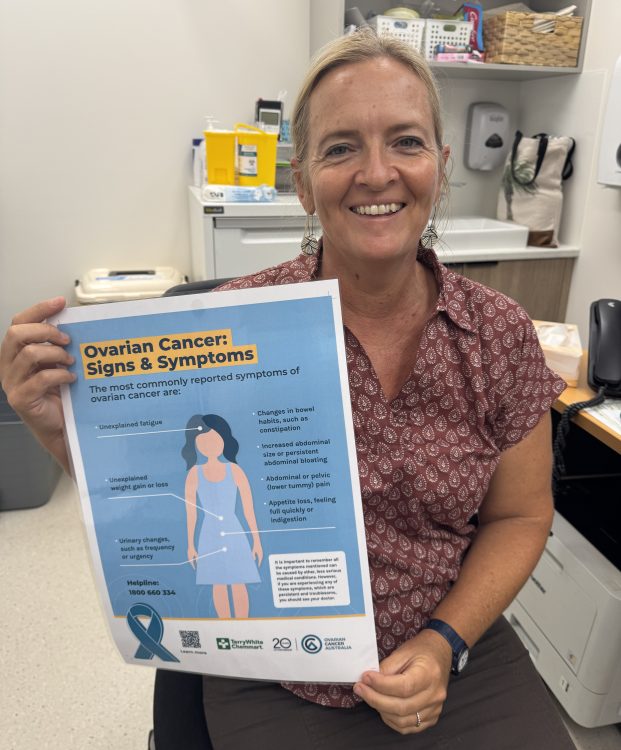Ovarian cancer is often called the “silent killer” because its symptoms can be so subtle. In honour of Ovarian Cancer Awareness Month, we spoke with Lisa Boase, our Women’s Health Nurse at Desert Blue Connect’s Women’s Wellness Centre. With professional and personal experience supporting her aunty through ovarian cancer, Lisa shares insights into symptoms, prevention, and how we can better support those going through a diagnosis.
Q: Lisa, you’ve supported someone with ovarian cancer. Can you share a bit about that experience?
Lisa: Yes, my aunty was diagnosed with ovarian cancer. It was a late diagnosis because she had ongoing symptoms that she didn’t act on for a while. She was a smoker, which put her at higher risk. By the time she was diagnosed, her abdomen looked really bloated, and she only got checked after family members noticed. That’s a key point with ovarian cancer—it can be hard to detect because the symptoms are so common, and they can easily be brushed off.
Q: What are the common symptoms of ovarian cancer?
Lisa: Symptoms can include bloating, a feeling of fullness even after eating, nausea, changes in your cycle, and bladder, bowel habit changes or new onset persistent lower back pain . But it’s important to note that these symptoms can also happen with many other conditions. What’s key is the persistence of these symptoms. If they last for a few weeks, it’s worth noting them down and discussing with your doctor.
Q: How can we catch ovarian cancer early if there’s no standard screening test?
Lisa: Unfortunately, there’s no simple screening test for ovarian cancer like there is for breast cancer. The best thing you can do is track symptoms over a period of time. A symptom diary can help identify patterns that might raise concerns. It’s also important to speak to your GP if you have a family history of ovarian or breast cancer, as they might suggest further investigations.
Q: Is genetic testing something that can help with early detection?
Lisa: Genetic testing can be helpful, especially if there’s a strong family history of ovarian or breast cancer. For example, if someone has a relative who was diagnosed with breast cancer under the age of 50, it might be worth exploring genetic testing. However, testing for the BRCA1 and BRCA2 genes doesn’t guarantee you’ll develop cancer; it just increases the risk. The decision to undergo testing should be discussed with a healthcare professional.
Q: What can women do to reduce their risk of ovarian cancer?
Lisa: There are a few lifestyle factors that can lower risk, such as not smoking and maintaining a healthy weight. Having children also reduces the risk, as women who haven’t had children are at higher risk for ovarian cancer. It’s all about taking care of your overall health.
Q: How can we best support someone going through ovarian cancer treatment?
Lisa: It’s really about being there for them in practical ways. Educate yourself about the disease, and don’t just say “let me know if you need anything”—take the initiative. Offer to help with meals, transport, or just check in with them. Ovarian cancer can feel overwhelming, so offering concrete support without expecting them to ask for help can make a big difference.
Q: Are there any myths about ovarian cancer that need to be cleared up?
Lisa: One big myth is that cervical screening can detect ovarian cancer. That’s not true. Cervical screening is for detecting cervical cancer, not ovarian. It’s important to understand the difference and not rely on a cervical screening as a catch-all for gynecological cancers.
Q: What advice do you have for women advocating for their own health?
Lisa: If something doesn’t feel right, speak up. Keep track of your symptoms, especially if they’re persistent. A symptom diary is really helpful. Doctors appreciate having written information because it helps them piece everything together. And if it’s nothing, that’s great—at least you’ve had peace of mind.
Q: What’s one thing you wish everyone knew about ovarian cancer?
Lisa: I wish people knew that scientists are working hard on finding better ways to diagnose and treat ovarian cancer. While there’s no simple test yet, there’s a lot of ongoing research. If you can, donate to ovarian cancer research during awareness campaigns to help fund that work.
A big heartfelt thank you to Lisa for not only sharing her invaluable insights but also her personal story. If you’re noticing any of the symptoms mentioned, please don’t hesitate to keep track of them and talk to a GP. Early detection can truly save lives, and your health is so important.

